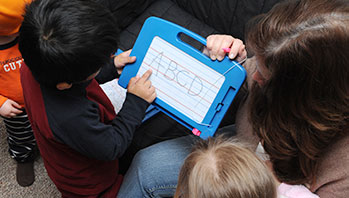- Between the Lions alphabet chart
- cookie sheet
- letter card “Uu”
- two boxes or bags, one with uppercase magnetic letters (“F,” “K,” “S,” “T,” and “U”) and one with lowercase magnetic letters (“f,” “k,” “s,” “t,” and “u”)
- writing materials
- curve
- letter
- straight
MA Standards:
English Language Arts/Foundational Skills/RF.PK.MA.1.d: Recognize and name some uppercase letters of the alphabet and the lowercase letters in one’s own name.
Head Start Outcomes:
Literacy Knowledge/Alphabet Knowledge: Recognizes that the letters of the alphabet are a special category of visual graphics that can be individually named.
PreK Learning Guidelines:
English Language Arts/Reading and Literature 7: Develop familiarity with the forms of alphabet letters, awareness of print, and letter forms.
Letter Sort (“Uu”)

© Commonwealth of Massachusetts, Department of Early Education and Care (Jennifer Waddell photographer). All rights reserved.
Skill Focus: Compare and Contrast, Letter Recognition, Vocabulary
Educator Prep: Print out the Between the Lions alphabet chart or create an alphabet chart on chart paper.
Use the Letter Sort Routine to help children distinguish letter shapes and recognize the shape of the target letter. Begin by sorting uppercase letters. Then repeat the process as you search the lowercase letter box for the letter “u.”
Letter Sort Routine
- Place plastic uppercase letters “F,” “K,” “S,” “T,” and “U” in a bag.
- Divide a piece of paper in half by drawing a line down the middle.
- Draw both a straight and a curvy line at the top left side of the paper and just a straight line at the top right side.
- Explain to children that they will decide if letters have straight or curvy lines.
- Pull the letter “F” out of the bag and say, Where should I place this letter “F”? Wait a moment or two for responses; then say, The letter “F” has all straight lines, so I will place it on the side of the paper that has only a straight line.
- When children have sorted all the letters, encourage volunteers to identify them by name.
- Have clay available and invite children to use it to shape the letters.
